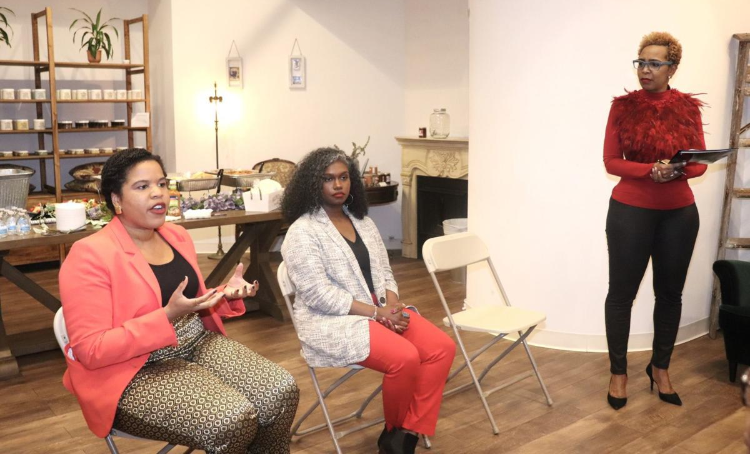Courtesy of The Philadelphia Tribune
Ayana Jones Tribune Staff Writer Mar 5, 2020
\Some strong Black women, particularly those who are entrepreneurs, are unaware that they are struggling with depression.
“Not only do they not know that they are depressed but they also are unable to see how to make themselves happy, yet they feel that they are responsible for someone else’s happiness,” Argie Allen Wilson, the founder and CEO of FAITH, said during a panel discussion.
“They also don’t know the range of their anger because they haven’t given themselves permission to feel. We are very much socialized to hold our emotions in even though we are very much emotional beings.”
She cited a study published by Sex Roles that found that depressive symptoms were related to the endorsement of the strong Black woman archetype.
Wilson was joined by two other therapists, Sue Ellen Zhang, owner of Ivy Therapist, and Donnetta Watson, psychotherapist at the Ladipo Group, during an event held Wednesday evening by the African American Chamber of Commerce. The therapists spoke candidly on a range of issues, including microaggressions in the professional environment, the impact of anxiety and depression on the family and navigating romantic relationships.
Watson sees women at her therapy practice who say they are overwhelmed due to the various roles they play, such as business owners, caretakers, mothers and professionals. She said it’s important that women take the time for self-care.
“It’s necessary, if you’re going to try live out all these different roles, that you have to give something back to yourselves so you can be of service to other people,” Watson said.
She has also encountered professional women who are dealing with microaggressions in the workplace.
“What I’ve seen happen a lot is that some of the women that I work with start to feel like they are experiencing imposter syndrome,” Watson said. “They start to self-doubt and then really question their place and their choices of profession.”
Watson often talks with these clients about use of positive affirmations and self-empowerment.
Zhang highlighted the impact of a mother’s mental well-being on her children.
“If you have a depressed mother in the home, then her children may end up continuing that pattern with living in a depressed state,” she said. “It’s really important for mothers and caretakers to take care of yourselves, so that you are then not perpetuating that cycle of what we call generational curses.”
Zhang often focuses on empowerment when engaging with her female clients, many of whom often feel hopeless.
“They don’t see a light at the end of the tunnel and what I talk about a lot is finding that light — that little spark — and working your way toward there, little by little,” she said.
Wilson recommends that women seek out a therapist if they are in a stressful work environment, branching out to entrepreneurship, or in a relationship with an entrepreneur.
“These are highly stressed environments so there needs to be a safe space where you can process some of this stuff,” she said. “Having those platforms for being able to talk about our mental health well-being is a good thing. It should be a normal part of our conversation to say, ‘Oh yeah, I go to therapy.’”
ajones@phillytrib.com 215-893-5747

